Some 40 years after he opened Bangkok’s most famous go-go bar, Tony Douglas looks back on an unforgettable era of great innocence that was ultimately reshaped by the massive US military presence in Thailand, Hollywood movies and the girls who won the hearts of countless visitors
By Colin Hastings
By Colin Hastings
| FOR a decade or so during the ‘70s and ‘80s, Patpong ruled supreme as Bangkok’s most popular entertainment district, attracting locals and waves of foreign tourists who were fascinated, thrilled and occasionally shocked by its racy mixture of lively pubs, inexpensive restaurants, wild discos and saucy go-go bars. Several places competed for the title of Patpong’s best bar, but in many people’s minds – then and now – the street’s outstanding venue during that golden era was unquestionably Mississippi Queen. |
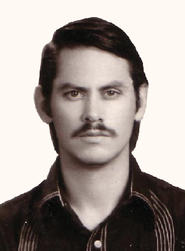
MQ had it all – friendly and accommodating hostesses, the prettiest and most attractive dancers in town, a sophisticated sound system that gave many customers their first taste of the deep rhythms of soul music, and an edgy, even slightly dangerous ambiance.
Regular clientele included journalists and photographers back from assignments in Vietnam, musi-cians, diplomats, hippy tourists and black US soldiers and airmen on R&R from the war in Indochi-na. Here too, inevitably, you’d come across the odd shady character with the “deal of a lifetime.”
The bar’s thoughtfully themed interior design stood out against Patpong’s other bars, and probably explains why it was chosen by Hollywood movie producer Michael Cimino for the ultimate anti-Vietnam war movie ‘The Deer Hunter’ starring Robert De Niro. Interestingly, the MQ’s top dancer at that time, a lithesome long-haired beauty called Noi, got herself a cameo role in the movie – and thousands of admirers.
The man behind Mississippi Queen was an Australian called Tony Douglas, an ex-hippie who had settled in Thailand in the late ‘60s and decided to open a venue featuring all the elements that he himself would want to find in a Bangkok bar.
The format he chose worked brilliantly and for a number of memorable years MQ was the ‘must-visit’ bar in a street that was simultaneously famous and infamous.
Sadly, the Mississippi Queen is long gone, but its legend lives on.
The BigChilli caught up recently with Tony, now living in Melbourne with his Cambodia-born wife and family, to chat about a fascinating, controversial and much-discussed era in Bangkok’s modern history.
What brought you to Thailand?
I grew up in Melbourne, Australia, in a normal middle class home. From a very early age, say around ten, I was very taken with American popular music, starting with Country, later Rock n Roll. I left school at 16 and worked for seven years with the Herald Newspaper in the advertising department.
In 1967, aged 24, I headed off to India via Hong Kong, Singapore, Malaysia and Thailand. I was the original backpacker, staying at a dollar-a-night Chinese Hotels. I loved the trip, but when I arrived in Thailand in July I was near broke. Never did reach India.
I lived with a Thai family in Thonburi for a month. It was all marvellous, except I couldn’t eat any-thing on the Thai menu. I am strictly vegetarian and they seemed not to understand what the term meant! Silly me, I thought that Thais, being Buddhist, would be vegetarians. Occasionally, I would eat in one of the two Indian restaurants I found in Bangkok, and this was heaven.
Regular clientele included journalists and photographers back from assignments in Vietnam, musi-cians, diplomats, hippy tourists and black US soldiers and airmen on R&R from the war in Indochi-na. Here too, inevitably, you’d come across the odd shady character with the “deal of a lifetime.”
The bar’s thoughtfully themed interior design stood out against Patpong’s other bars, and probably explains why it was chosen by Hollywood movie producer Michael Cimino for the ultimate anti-Vietnam war movie ‘The Deer Hunter’ starring Robert De Niro. Interestingly, the MQ’s top dancer at that time, a lithesome long-haired beauty called Noi, got herself a cameo role in the movie – and thousands of admirers.
The man behind Mississippi Queen was an Australian called Tony Douglas, an ex-hippie who had settled in Thailand in the late ‘60s and decided to open a venue featuring all the elements that he himself would want to find in a Bangkok bar.
The format he chose worked brilliantly and for a number of memorable years MQ was the ‘must-visit’ bar in a street that was simultaneously famous and infamous.
Sadly, the Mississippi Queen is long gone, but its legend lives on.
The BigChilli caught up recently with Tony, now living in Melbourne with his Cambodia-born wife and family, to chat about a fascinating, controversial and much-discussed era in Bangkok’s modern history.
What brought you to Thailand?
I grew up in Melbourne, Australia, in a normal middle class home. From a very early age, say around ten, I was very taken with American popular music, starting with Country, later Rock n Roll. I left school at 16 and worked for seven years with the Herald Newspaper in the advertising department.
In 1967, aged 24, I headed off to India via Hong Kong, Singapore, Malaysia and Thailand. I was the original backpacker, staying at a dollar-a-night Chinese Hotels. I loved the trip, but when I arrived in Thailand in July I was near broke. Never did reach India.
I lived with a Thai family in Thonburi for a month. It was all marvellous, except I couldn’t eat any-thing on the Thai menu. I am strictly vegetarian and they seemed not to understand what the term meant! Silly me, I thought that Thais, being Buddhist, would be vegetarians. Occasionally, I would eat in one of the two Indian restaurants I found in Bangkok, and this was heaven.
Before leaving Thailand, I met a Thai girl and was determined to return, which I did.
I went back to Perth and worked for a year to save some money. On my return to Thailand, I landed a job in the advertising department of the Bangkok Post for the princely salary of 5,000 baht a month! The problem was that a decent one bedroom apartment in the Sathorn area cost the same amount! Happily, I found a one room place in a Soi behind the Soviet Embassy, between Sathorn and Silom Roads. Naturally I spoke no English and was expected to sell advertising! I bought a 90cc Honda motorbike and on this I learnt the layout of Bangkok. I got lost many times but in the end knew all the back lanes.
The Thai girl I mentioned earlier, she and I married in 1969 and had two kids.
What were your first impressions of Bangkok?
In those days there were very few tourists and Thais loved striking up a conversation with foreign-ers. I was always easy going myself, so we got along just fine. It was possible to park pretty much anywhere and there we no limits on time or parking meters.
The American military had a huge presence and, as best I can recall, there were around 50,000 US soldiers and airforce personal stationed here. JUSMAG (the US military complex on Sathorn Road) played a big part in the Vietnam war planning and implementation.
The night life for the GIs was centred on Petchburi Road. Mostly it was dance halls, where hun-dreds of young Thai girls wandered around and the Americans would choose one and either dance or leave together. I can’t recall the prices.
The place I would regularly attend was Jack’s American Star bar, way out on Petchburi. Downstairs was a nightclub, while upstairs was a restaurant with booths, specialising in soul food. I went for the bad coffee and the juke box, which played all the great soul music – which was beginning to become hugely popular worldwide. I was the almost the only white face there and I recall friends thought I was mad to risk my life there. I must say I was treated very cordially and never had any drama. I guess they knew I just loved the music.
Little did I know that Jack’s
owners were part of one of the most brazen heroin importing business-es into the
USA! One method used was secreting the heroin in bodies of US soldiers who had been killed in the war.
The movie ‘American Gangster’ starring Denzel Washington and Russell Crowe was based on what was going on there.
How did you end up owning a Patpong bar?
After working for the Bangkok Post for a year, I obtained my “permanent residence” visa, so I left and started a real estate office specialising in finding rental properties for expatriates. I ended up doing very well out of it, but worked seven days a week. During this time I bought a Ford Corsair V4, which I must say was one of the worst cars I have owned!
In 1971 I got a job at Cathay Advertising (later named Ted Bates), which was located in the IBM Building on Patpong 2. I was an account director, responsible for 16 clients. It was a demanding job, but it brought me into contact with Patpong Road for the first time.
Back then Patpong was not wall-to-wall bars. It was the location of a Thai bank, QANTAS, Air France, China Airlines, Air Vietnam, Gestetner printers, Shell and an audio store. I also recall a barber shop, greetings cards shop, travel agent and Mizu’s Kitchen, Tip Top coffee shop and the amazing Thai Room.
By 1972 I decided I could do better and have more fun by running my own bar. I realised that good music was what was missing back then.
An old bar called The Patpong Café was running at a loss and I bought the leasehold for very little. This was October, 1972. My work colleagues all told me I was mad, that the Vietnam War was winding down and US troops in Thailand were pulling out. They frankly scared me. Truth is they hoped I’d fail!
The bar we created was very well appointed with wonderful woodwork which hinted at a river boat. I naturally renamed it the Mississippi Queen and introduced the soul music feature and go-go danc-ers – we may not have been the first to have girls dancing, but we were certainly the first bar to have dance platforms and brass holding bars.
Tourism numbers were very low in those days and also extremely seasonal. It was touch and go making a go of it, because money was tight. Gradually, the place gained a reputation and the girls we employed were of high calibre, especially the dancers.
I went back to Perth and worked for a year to save some money. On my return to Thailand, I landed a job in the advertising department of the Bangkok Post for the princely salary of 5,000 baht a month! The problem was that a decent one bedroom apartment in the Sathorn area cost the same amount! Happily, I found a one room place in a Soi behind the Soviet Embassy, between Sathorn and Silom Roads. Naturally I spoke no English and was expected to sell advertising! I bought a 90cc Honda motorbike and on this I learnt the layout of Bangkok. I got lost many times but in the end knew all the back lanes.
The Thai girl I mentioned earlier, she and I married in 1969 and had two kids.
What were your first impressions of Bangkok?
In those days there were very few tourists and Thais loved striking up a conversation with foreign-ers. I was always easy going myself, so we got along just fine. It was possible to park pretty much anywhere and there we no limits on time or parking meters.
The American military had a huge presence and, as best I can recall, there were around 50,000 US soldiers and airforce personal stationed here. JUSMAG (the US military complex on Sathorn Road) played a big part in the Vietnam war planning and implementation.
The night life for the GIs was centred on Petchburi Road. Mostly it was dance halls, where hun-dreds of young Thai girls wandered around and the Americans would choose one and either dance or leave together. I can’t recall the prices.
The place I would regularly attend was Jack’s American Star bar, way out on Petchburi. Downstairs was a nightclub, while upstairs was a restaurant with booths, specialising in soul food. I went for the bad coffee and the juke box, which played all the great soul music – which was beginning to become hugely popular worldwide. I was the almost the only white face there and I recall friends thought I was mad to risk my life there. I must say I was treated very cordially and never had any drama. I guess they knew I just loved the music.
Little did I know that Jack’s
owners were part of one of the most brazen heroin importing business-es into the
USA! One method used was secreting the heroin in bodies of US soldiers who had been killed in the war.
The movie ‘American Gangster’ starring Denzel Washington and Russell Crowe was based on what was going on there.
How did you end up owning a Patpong bar?
After working for the Bangkok Post for a year, I obtained my “permanent residence” visa, so I left and started a real estate office specialising in finding rental properties for expatriates. I ended up doing very well out of it, but worked seven days a week. During this time I bought a Ford Corsair V4, which I must say was one of the worst cars I have owned!
In 1971 I got a job at Cathay Advertising (later named Ted Bates), which was located in the IBM Building on Patpong 2. I was an account director, responsible for 16 clients. It was a demanding job, but it brought me into contact with Patpong Road for the first time.
Back then Patpong was not wall-to-wall bars. It was the location of a Thai bank, QANTAS, Air France, China Airlines, Air Vietnam, Gestetner printers, Shell and an audio store. I also recall a barber shop, greetings cards shop, travel agent and Mizu’s Kitchen, Tip Top coffee shop and the amazing Thai Room.
By 1972 I decided I could do better and have more fun by running my own bar. I realised that good music was what was missing back then.
An old bar called The Patpong Café was running at a loss and I bought the leasehold for very little. This was October, 1972. My work colleagues all told me I was mad, that the Vietnam War was winding down and US troops in Thailand were pulling out. They frankly scared me. Truth is they hoped I’d fail!
The bar we created was very well appointed with wonderful woodwork which hinted at a river boat. I naturally renamed it the Mississippi Queen and introduced the soul music feature and go-go danc-ers – we may not have been the first to have girls dancing, but we were certainly the first bar to have dance platforms and brass holding bars.
Tourism numbers were very low in those days and also extremely seasonal. It was touch and go making a go of it, because money was tight. Gradually, the place gained a reputation and the girls we employed were of high calibre, especially the dancers.
| How pervasive was the US military presence back then? Military personnel were mostly billeted in hotels in the Sukhumvit region, as well as upcountry. They earned low wages and were provided with their own clubs serving super cheap liquor. But they loved what Patpong had to offer and especially the MQ with its great dancers and wonderful music. I spent the days buying newly released Soul and Disco music and then would create three-hour reel to reel tapes to play at night. Personally, I always despised the war and the West’s reason for being involved, but I mostly liked the US troops who were generally young and generous. Then there were the regular R&R troops who flew in directly from the Vietnam front line. They lived like today was their last on earth. And of course they fell in love with the Thai girls, big time! Did you enjoy running Mississippi Queen? Running a bar may sound like a dream job and, for a time, it was. I met people from all over the world and many of them were very interesting. But the same questions night after night does wear you down. “How much money do you make?” was frequently asked. My response: “Not enough.” And the filthy smoke…I have never smoked and find the habit obnoxious. And I hope I haven’t contracted second-hand lung cancer. |
What was Bangkok’s nightlife back then?
Foreign guys had a ball. It was basically fun and friendly. I never even bothered to visit the famous “sex shows,” but everyone to their own.
Thai men’s idea of a fun night out was totally different. Their clubs were dead until 11pm and when you entered you were in almost total darkness. Thais rarely came to Patpong.
So MQ was an instant success?
Far from it. There were months when things were very quiet indeed and it was touch and go just paying the rent, which, incidentally, took to about mid-month just to cover!
In late 1977 the bar was chosen for three scenes of the movie, Deer Hunter. I had the opportunity to meet Robert DeNiro in his room at the Oriental Hotel. A very pleasant man. I also met Michael Cimino, the movie’s director, who I found very demanding. Filming took three nights but they paid well and in cash.
Other than Mississippi Queen, what was your favourite Patpong bar?
The Napoleon. I needed to escape the madness and enjoyed the movies they played there. I knew the Thermae and Nana Hotel long before the Arabs found them.
I was a terror with the ladies, even though I was married, until 1978 or so.
Foreign guys had a ball. It was basically fun and friendly. I never even bothered to visit the famous “sex shows,” but everyone to their own.
Thai men’s idea of a fun night out was totally different. Their clubs were dead until 11pm and when you entered you were in almost total darkness. Thais rarely came to Patpong.
So MQ was an instant success?
Far from it. There were months when things were very quiet indeed and it was touch and go just paying the rent, which, incidentally, took to about mid-month just to cover!
In late 1977 the bar was chosen for three scenes of the movie, Deer Hunter. I had the opportunity to meet Robert DeNiro in his room at the Oriental Hotel. A very pleasant man. I also met Michael Cimino, the movie’s director, who I found very demanding. Filming took three nights but they paid well and in cash.
Other than Mississippi Queen, what was your favourite Patpong bar?
The Napoleon. I needed to escape the madness and enjoyed the movies they played there. I knew the Thermae and Nana Hotel long before the Arabs found them.
I was a terror with the ladies, even though I was married, until 1978 or so.
| Were you hassled by the authorities back then? The police were no problem whatsoever. There was no graft and we would do the usual Thai thing and give the beat cops money on the New Year holiday. We did have a few punch ups and once a Thai fellow pulled a gun in the bar. Then, one weekend afternoon, we had three very nasty drunks threatening to harm the staff and wreck the bar. I kept CS spray (military issue) behind the bar and, after kind words failed, I blasted them with amazing effect. Game over. MQ wins! I never used it again. Bars in Australia would react far more aggressively. Can Patpong’s glory days of the 1970s be revived? No, those days will never return. There was an innocence about the place – and then there was also the music. Don’t think One Direction or even Puff Daddy would have cut it! What did you do after closing Mississippi Queen? After six lonely years in Australia, by an incredible stroke of luck and fate I met my current wife, Seda, a Cambodian lady, right here in Melbourne. Since then I have never looked back. That was May 1984. Seda is a former refugee. Happily the Cambodian culture is extremely close to the Thai. I get along famously with all her family. We travel at least once a year to Cambodia which has the innocence and amazing friendliness that Thailand had when I arrived so long ago. From around 1982 I worked in the advertising field and also managed an industrial/machinery ex-hibition where I made good money and made good friends. Life couldn’t be better. My 26-year-old son runs a hugely successful kick boxing gym. He has no interest in Asia or Asian women. Indeed, he has no interest in travel. He finds it hard to believe I never watched Thai boxing during the ten years I lived in Thailand. Have you visited Patpong in recent years? In 1988 and 1990 Seda and I visited Patpong and its night market. It was all rather sad. They were great years in Bangkok, but I never really thought I’d end up there permanently. Mean-while, it annoys the hell out of me that Thais can buy property here in Australia, while I couldn’t buy a square metre in Thailand. Any regrets about your time in Thailand? Not running faster. |

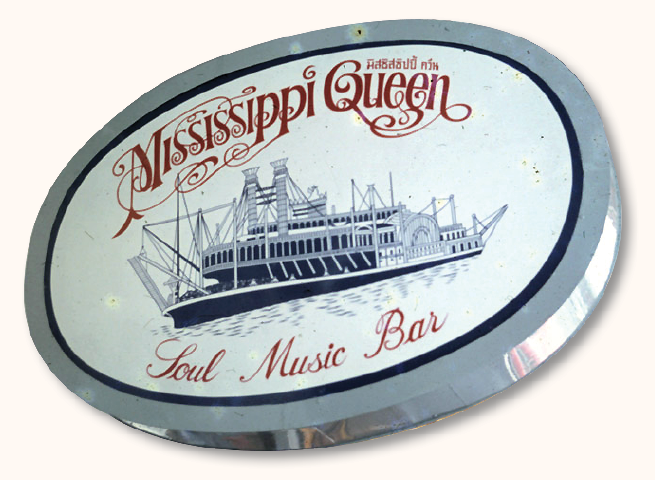
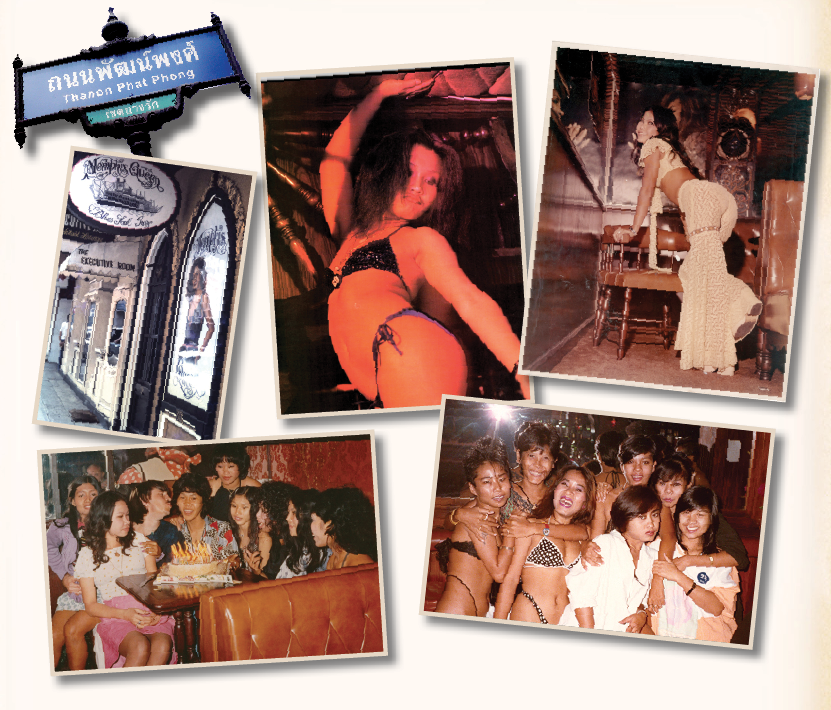
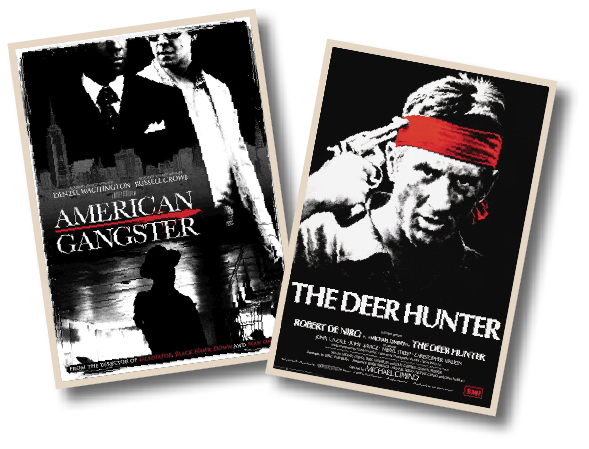
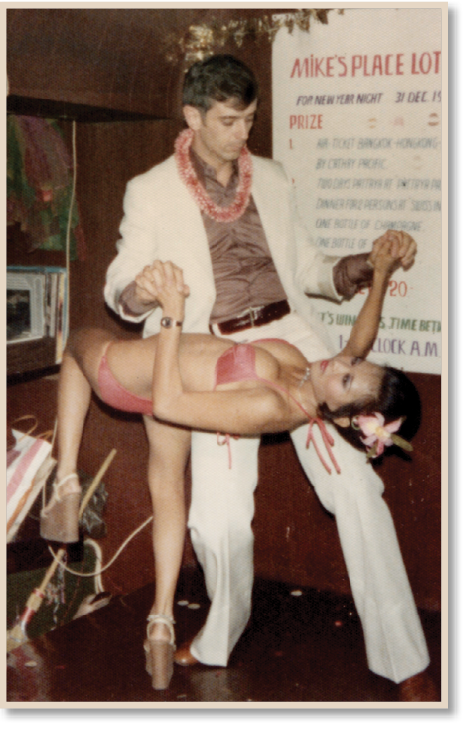

 RSS Feed
RSS Feed
















